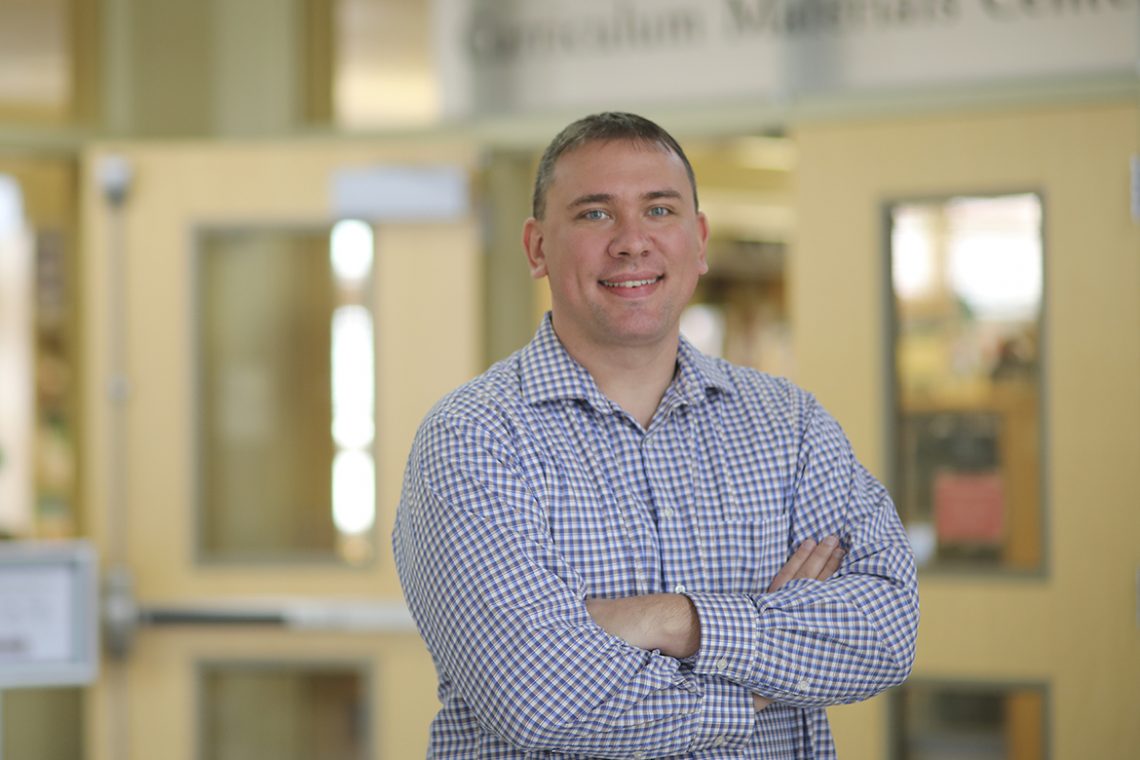In this month’s missive from a member of the University’s leadership team, Interim Director of Graduate Programs in Education Brian Cavanaugh ’04 reports on UMF’s new certificate and graduate degree offerings, the program’s strong enrollment growth, and why the blended-delivery model — a hallmark of UMF’s graduate-level instructional approach — provides students with the “best of both worlds.”
Dear Alumni and Friends of UMF,
Just the other day, throughout the first two floors of the Kalikow Education Center, faculty and students were deeply immersed in conversations about coaching math teachers, conducting educational research, and teaching science to young children — on a Saturday! Those of you who are enrolled in one of our many graduate education programs know that this level of engagement is typical of the transformative learning opportunities that we offer.

Brian Cavanaugh ’04, Interim Director of Graduate Programs in Education at UMF.
This is one of the many reasons I am proud to call UMF my alma mater. It is also why I am delighted to share with you how UMF’s graduate education and outreach efforts are serving Mainers from Kittery to Fort Kent — on the Farmington campus, online, and across the state.
Upon completion of their programs, our graduate students assume important leadership positions throughout Maine. Alumni of UMF’s graduate programs include school principals and assistant principals, a state Head Start administrator, district administrators, instructional coaches, the District Early Childhood and Youth Coordinator for Maine Roads to Quality, program administrators, and mentors. Many more are educational leaders in their school districts or serve on state-level professional organizations. Others have leveraged their graduate work to new roles and rewarding professional advancement.
Enrollment in graduate programs at UMF has almost doubled over the past five years, and our programs are so successful that we are continuing to expand. In the next six to 18 months, we are poised to roll out additional graduate offerings in education as well as the arts and sciences, including new graduate certificates in special education, special education administration, and mathematics intervention.
At UMF, our graduate students learn from full-time expert faculty in our education programs and also take courses from experienced educators and administrators. This combination of strong expertise and extensive practical experience makes for an incredible learning experience where cutting-edge research is applied to the everyday issues educators face. Our blended-delivery instructional model, featuring a mix of on-site and online courses, is designed for working professionals, so they can rapidly move from theory to practice in their own classrooms and schools. We offer courses during the summer months, on weekends, at satellite centers throughout Maine, on-site at local school districts, and online. Graduates of our programs continue to tell us that our blended-delivery approach offers the best of both worlds.
Through this approach, our students develop significant expertise, learning key research and inquiry skills to affect change at the local level in schools, centers, and organizations across Maine. Examples of research conducted by students include exploring issues related to young children’s social and emotional development, 21st century technology in schools, parent involvement in math education, rural special education, student motivation, integrating literacy and mathematics, and using social media in the classroom — just to name a few.
In addition to our strong master’s degree programs in Educational Leadership and Early Childhood Education, UMF’s Office of Graduate Studies is very active with educational outreach efforts. Led by Director of Educational Outreach Sandy MacArthur, we offer 11 graduate certificates in areas such as school administration, mathematics leadership, and English Language Learners. We also house the Maine Mathematics Coaching Project, a statewide effort designed to support school districts and educators seeking to improve the quality of teaching and learning in mathematics.
To support our growth, this spring, we are searching for three additional faculty to teach in our graduate programs in educational leadership, mathematics education, and special education.
We also continue to expand our professional development offerings to better meet the needs of in-service educators. I invite you to participate in these powerful learning opportunities for educators, such as our first annual Assistive Technology Summit on April 25, 2019, or the day-long workshop Resilient Teachers, Resilient Students on May 17, 2019.
If you are interested in coming back to UMF to advance your career and become a more skillful and knowledgeable educator, I encourage you to take a course, attend a professional development event, complete a certificate, or start a master’s degree program. And, please feel welcome to drop by the Office of Graduate Studies in UMF’s Kalikow Education Center if you want to learn more about what we are doing.
In the meantime, please peruse these online resources for more information:
- Information about master’s degrees and graduate certificates
- Summer 2019 graduate course list (registration begins March 25, 2019)
- Information about upcoming professional development events
- For questions or inquiries: gradstudies@maine.edu
I hope to see you on campus soon!
Brian Cavanaugh ’04
Interim Director of Graduate Programs in Education
Cavanaugh earned his B.S. in special education at UMF and went on to earn his master’s at Harvard and Ph.D. at the University of Maine. This is his second faculty post at UMF. After serving as a professor in the University’s Special Education program, he spent a year conducting school compliance reviews and doing special education policy work for the Massachusetts Department of Education. He was then director of Social and Emotional Learning for Portland Public Schools, a role that involved ensuring the city’s nearly 500 homeless students receive educational services. In addition to leading UMF’s graduate studies offerings, he continues to consult in Regional School Units 10 and 74, as well as Maine’s Bureau of Indian Education Schools.

